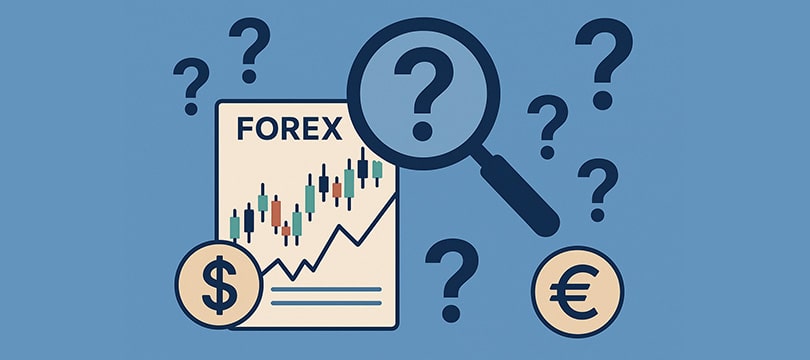Approaching Forex Trading: Answering the Four Key Questions for Beginners
Approaching Forex trading often involves natural doubts and questions, especially for those who don't have experience yet. These doubts reveal four fundamental and legitimate queries. In this guide, we explore these very questions, providing (obviously) their answers.
Forex Trading: A Complex Activity
Forex trading is certainly fascinating, but it presents significant challenges, particularly for beginners. Understanding how this market works requires time and dedication.
- Extreme Volatility. The Forex market can be highly volatile, with rapid fluctuations. This can lead to substantial profits but also significant losses if operations and risk are not managed well.
- Risk Management. Learning to manage risk is crucial for success in Forex trading. Traders must use techniques like stop-loss and have a good understanding of strategies to limit losses.
- Technical and Fundamental Analysis. Forex trading requires specific skills in reading charts (technical analysis) and understanding global economic events (fundamental analysis). Acquiring expertise in both these areas is essential for making informed decisions.
Let's now look at the four most frequent questions every aspiring trader asks before starting.
First Question: How Much Money Is Needed to Start Forex Trading?
This is an essential question that often emerges first. Financial availability represents one of the most important aspects to consider, or at least it is perceived as such.
So,
how much money is needed to start Forex Trading?
Enough,
but you can start with very low amounts, from a few tens of euros, thanks to brokers offering micro or mini accounts.
After all, the Forex market allows for a fairly democratic entry, but be careful: starting with extremely small sums
limits possible strategies and increases vulnerability to volatility.
Ideally, a beginner should have at least
a few hundred euros to carry out operations that allow for more balanced risk management and testing different strategies without excessive pressure.
With larger sums, on the other hand, you can have access to balanced leverage, which multiplies purchasing power, but should always be used with great caution.
Second Question: What Is Leverage and How Does It Work in Forex Trading?
More than a doubt, it's a curiosity. There's a lot of talk about leverage. Some demonize it, others consider it the panacea for all ills. The truth obviously lies in the middle.
From a technical point of view, leverage allows you to invest amounts higher than the capital actually owned,
thus amplifying gains and losses.
Leverage is a fundamental tool in Forex trading, often offered by brokers in ratios ranging from 1:30 up to 1:500 or more.
For example, with a leverage of 1:100, a trader can move 10,000 euros
having deposited only 100. This tool can multiply profits, but be careful: it also increases the risk of considerable losses.
It's no coincidence that we talk about "responsible leverage management", an approach that involves setting strict money management rules and using tools like stop-loss to limit risks.
Third Question: How Do You Make Money with Forex Trading?
It's the basic question, yet widespread. Obviously, 100% of beginners ask it, those who approach trading even out of curiosity.
However, how do you make money with Forex Trading? You earn
by exploiting variations in the exchange rate between two currencies.
Profit in Forex trading comes from the difference between the opening and closing price of a position on a currency pair, for example EUR/USD. If a trader thinks the euro will appreciate against the dollar, they will buy euros and sell dollars. If this prediction comes true, they will gain on the difference between the initial and final price. However, earning consistently in Forex trading requires not only good forecasts but also discipline, strategy, and the ability to emotionally manage adverse market phases.
Fourth Question: What Are the Best Tools for Analyzing the Forex Market?
The main tools include charting software, economic calendars, and technical indicators.
To effectively analyze the Forex market, traders use
various resources. Charting software allows real-time monitoring of price variations and the application of technical indicators such as moving averages, RSI, and MACD.
Economic calendars help follow events and news that can influence exchange rates, such as interest rate decisions, employment reports, or GDP data. The combination of these tools allows for better anticipation of market movements and more informed decision-making.




